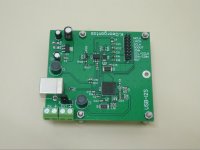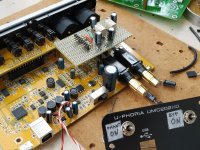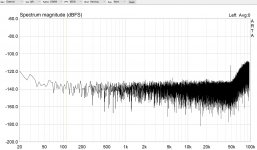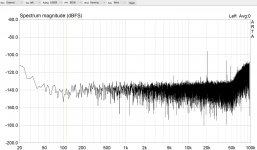Just for the record...
The soundcard with the last modifications works fine and stable. But... I really needed to try that:
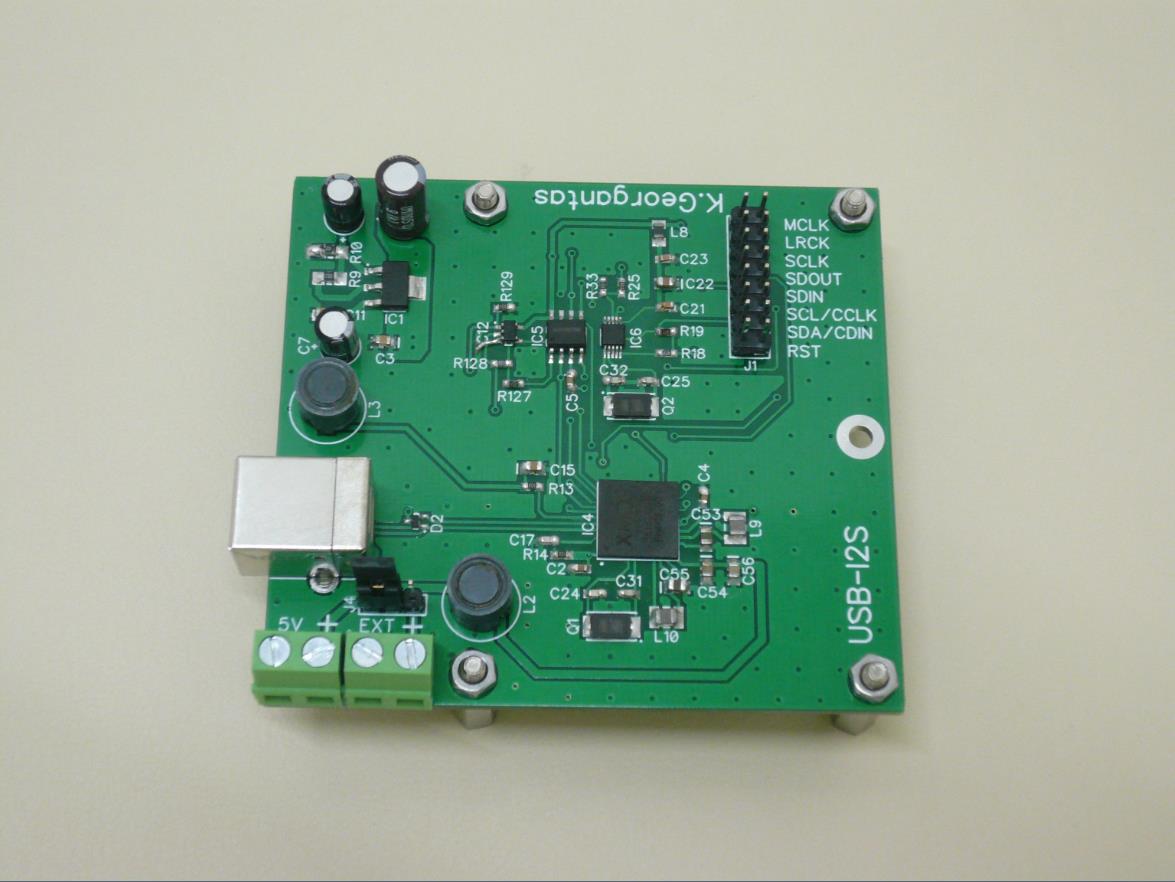
Winter and spring project. A multi layer pcb involving a BGA96 chip. Anti-diy conspiracy, no doubt. 😀 I didn't make it to work. And I'm not going to insist on that anymore. I mean, it was a very interesting learning curve, I know a little bit more now but debugging this is simply beyond my reach.
So, I'm in search for a readily available USB to I2S module capable for data in and out plus master clocks and everything as shown on the picture. I need it for the "sequel" of this project. I found that one :XMOS Multichannel high-quality USB to/from I2S/DSD SPDIF PCB - DIYINHK Any opinions or suggestions for alternatives would be much appreciated.
The soundcard with the last modifications works fine and stable. But... I really needed to try that:
...
...PS. Meanwhile, I've been playing... An application notes "copy and paste" without deviations. With through hole parts.😀 That was the easy part. It needs a USB to i2s converter. The plan is to reverse engineer Behringer's pcb and transplant the chips hopefully with their conscious intact i.e. make use of the proprietary drivers. Winter's project.
Winter and spring project. A multi layer pcb involving a BGA96 chip. Anti-diy conspiracy, no doubt. 😀 I didn't make it to work. And I'm not going to insist on that anymore. I mean, it was a very interesting learning curve, I know a little bit more now but debugging this is simply beyond my reach.
So, I'm in search for a readily available USB to I2S module capable for data in and out plus master clocks and everything as shown on the picture. I need it for the "sequel" of this project. I found that one :XMOS Multichannel high-quality USB to/from I2S/DSD SPDIF PCB - DIYINHK Any opinions or suggestions for alternatives would be much appreciated.
Attachments
A very informative topic! 10x@ MagicBus!
You can try this one :
MCHStreamer - USB Audio Swiss-Army knife - Multichannel PCM/DSD/PDM/ADAT/TDM/SPDIF interface
You can try this one :
MCHStreamer - USB Audio Swiss-Army knife - Multichannel PCM/DSD/PDM/ADAT/TDM/SPDIF interface
This mod is similar to one of MagicBus mods, but with relays.
https://www.elektroda.pl/rtvforum/topic3655998.html
I made the same mod, on a breadboard. The results were much better.
Unfortunately, when measuring I burned the ADC input op amp 🙁. The codec survived.
I ordered a replacement.
I found frequency spikes in the audio amplitude spectrum. Their origin was the 48V boost.
It does not switch off when the 48V switch is Off. So - I added another switch disconnecting the power of the booster.
https://www.elektroda.pl/rtvforum/topic3655998.html
I made the same mod, on a breadboard. The results were much better.
Unfortunately, when measuring I burned the ADC input op amp 🙁. The codec survived.
I ordered a replacement.
I found frequency spikes in the audio amplitude spectrum. Their origin was the 48V boost.
It does not switch off when the 48V switch is Off. So - I added another switch disconnecting the power of the booster.
Attachments
Last edited:
Thanks! Your work is nice too! I checked your website but I can't read Bulgarian. Could you please explain what have you done around C81, C85? Also if you could elaborate about the noise related with the 48V phantom power? Is it the high pitched spike mentioned earlier?
I have extracted the whole USB section of my sound card to build the -failed - module shown in post #61. I may try to restore it but it will take some mental preparation... But sniffing around that section, I found something interesting. There is only one 3,3V regulator for all the chips - the XMOS microcontroller, the flash memory and the PLL clock. Sadly, even decoupling capacitors are missing. And then this power rail goes to the audio codec digital supply via just an inductor. I think this may be the culprit for the high pitched noise after all. It would be very interesting if somebody could try to separate the audio codec from the rest. The mod seems very easy. Just remove the inductor L11 and feed the CS4272 from another 3,3V LDO.
The miniDSP module is nice but it lacks the I2C ports from what I understand. Not sure if it's necessary but also I don't know how to configure the audio codec in this case. So, I've ordered the DIYINHK module. It's on the way.
I have extracted the whole USB section of my sound card to build the -failed - module shown in post #61. I may try to restore it but it will take some mental preparation... But sniffing around that section, I found something interesting. There is only one 3,3V regulator for all the chips - the XMOS microcontroller, the flash memory and the PLL clock. Sadly, even decoupling capacitors are missing. And then this power rail goes to the audio codec digital supply via just an inductor. I think this may be the culprit for the high pitched noise after all. It would be very interesting if somebody could try to separate the audio codec from the rest. The mod seems very easy. Just remove the inductor L11 and feed the CS4272 from another 3,3V LDO.
The miniDSP module is nice but it lacks the I2C ports from what I understand. Not sure if it's necessary but also I don't know how to configure the audio codec in this case. So, I've ordered the DIYINHK module. It's on the way.
Hi MagicBus. The nice mod is not mine. The link is taken from a polish site.
My mod is with the ugly prototype board. I haven't removed any input components around C81 and C85.
The noise from the 48V boost was rather strange. It presented itself as a spike and a noise floor increase around 50kHz. I saw several times a spike around 26kHz, but not every time. That was rather strange. 😕
When I change the ADC input op amp I will post some pictures of the noise observed.
I will mod also the VCOM as you discovered and described in post 18.
My mod is with the ugly prototype board. I haven't removed any input components around C81 and C85.
The noise from the 48V boost was rather strange. It presented itself as a spike and a noise floor increase around 50kHz. I saw several times a spike around 26kHz, but not every time. That was rather strange. 😕
When I change the ADC input op amp I will post some pictures of the noise observed.
I will mod also the VCOM as you discovered and described in post 18.
Ah, OK! I was lost in translation. Anyway, the Vcom mod is dealing with a spike that usually appears below 20kHz. And I feel that all it does is to hide the problem under the carpet. Perhaps it would pay off to decouple the digital power supply of CS4272 as described in my last post. And it's easier too.
Hi ! i wonder if anyone has experience with cable like this one 🙄
USB-B adapter cable for external USB-A power supply - Audiophonics
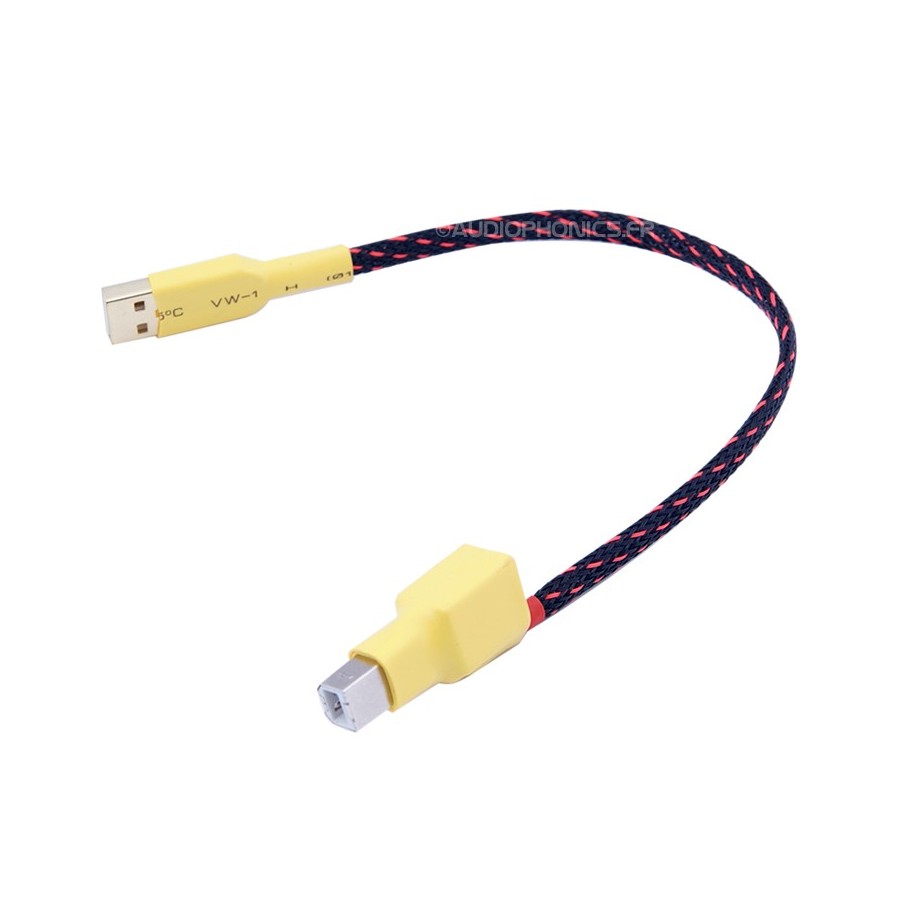
that would allow for the use of a very low noise +5VDC power supply instead of the voltage from the pc ... 😱
i am waiting for one to be delivered.
I guess that with some diy it could be built
USB-B adapter cable for external USB-A power supply - Audiophonics

that would allow for the use of a very low noise +5VDC power supply instead of the voltage from the pc ... 😱
i am waiting for one to be delivered.
I guess that with some diy it could be built
I had a look at the specs: nothing stating audio levels, frequency response, THD, noise etc.A very informative topic! 10x@ MagicBus!
You can try this one :
MCHStreamer - USB Audio Swiss-Army knife - Multichannel PCM/DSD/PDM/ADAT/TDM/SPDIF interface
CE declaration refers to EN55022 only - this is a typical joke from china, import into EU is illegal.
@ ginetto61 : Yes, it's very easy to build one and I did tried that. It allowed to use a beefy linear psu for a test. Mostly I did it to supply the circuit with real 5V because the usb Vbus loaded by the sound card and after some on board filtration was actually 4,25V. Anyway there was no improvement as far as I could measure.
Last edited:
MiniDSP are well known. In fact, I bought mine from EU store Audiophonics - Produits Hi-Fi Audio Electroniques et DIY - AudiophonicsI had a look at the specs: nothing stating audio levels, frequency response, THD, noise etc.
CE declaration refers to EN55022 only - this is a typical joke from china, import into EU is illegal.
There is no frequency responce. This is only USB to I2S converter. The ADC/DAC has to be wired separately.
@ ginetto61 : Yes, it's very easy to build one and I did tried that. It allowed to use a beefy linear psu for a test.
Hi ! thanks a lot for the kind and very helpful reply. Not only beefy but also very clean like batteries for instance. I have bought also some dc-dc converters to try out using the same usb sound card. I am curious to see the impact on its noise floor, if any ... i will see
i see 🙁 May this may that internal power regulation on your card has a great PSRR and then be very well executed ? 🙄 (sorry i miss your card brand and model. Mine is a very cheap and old Terratec Aureon 5.1 USB mkII made in Taiwan)Mostly I did it to supply the circuit with real 5V because the usb Vbus loaded by the sound card and after some on board filtration was actually 4,25V. Anyway there was no improvement as far as I could measure.
I am quite sure my cheap card is not the same and i expect to see some changes ... and i hope to be able to compare different +5VDC voltage source floor noise wise
Ok i could have done that much better with a scope maybe ... but i do not have one 😱
I am in the learning phase ... since almost 11 years now 😱
Clearly i am slow at learning
Thanks a lot again. Kind regards, gino
Last edited:
"..there was no improvement as far as I could measure." i.e. as far as the sound card itself could measure 😀 The problem with noise coming from the PC is that you can't avoid the ground connection shared also for data transfer unless you use some kind of expensive isolator. That's why I think the external psu is meant only to bypass the usb power limitations.
"..there was no improvement as far as I could measure." i.e. as far as the sound card itself could measure 😀 The problem with noise coming from the PC is that you can't avoid the ground connection shared also for data transfer unless you use some kind of expensive isolator. That's why I think the external psu is meant only to bypass the usb power limitations.
Thanks a lot again i see. You mention ...
actually i see some cheap ones on ebay. Better not to waste money on them ? i like the idea to send only data from the pc to the sound card a lot. Anyway i have to wait and see. I am just using Arta SW to get some indications...you can't avoid the ground connection shared also for data transfer unless you use some kind of expensive isolator ...
With a very clean power source all depends on the card quality
Last edited:
Since I have no experience with the sound card you use, I can't be really helpful... Just my two cents: With these cheap sound cards we are messing, it is very doubtful they could reveal noise of that low level. But again, what is DIY worthing without trying?
With a very clean power source all depends on the card quality
As mentioned above the USB data connection still uses the onboard ground in vicinity of the USB controller. Very often the difference between that ground and the PC protection-earth wire ground contains lots of noise generated by currents in the PC ground lanes. If the DUT is grounded too, a noisy ground loop is created if the ground wire is connected from the soundcard to the DUT (i.e. when not using balanced output/input = the ground wire is used for the return signal).
Since I have no experience with the sound card you use, I can't be really helpful... Just my two cents: With these cheap sound cards we are messing, it is very doubtful they could reveal noise of that low level. But again, what is DIY worthing without trying?

Since I have no experience with the sound card you use, I can't be really helpful... Just my two cents: With these cheap sound cards we are messing, it is very doubtful they could reveal noise of that low level. But again, what is DIY worthing without trying?
I see and thank you very much indeed. Is there any way to get full electrical isolation between the pc and the card ?
would it be useful ? 🙄
Last edited:
Sorry, I haven't look at this at all. Being a novice myself, all I can do is to give some practical advice. I think it is unlikely the noise from usb to set the noise floor of your sound card. If you can't see below -140dB then you should not bother with the usb end IMHO. Let alone that with ARTA most likely it will be usable only up to 24kHz. If the problem is ground loops then follow the advice by @phofman and isolate the sound card input from the DUT. I'll just add that the gain structure of the input in your measurement set up is equally important as in any audio system. So, for a given hardware to start, there are limits regarding improvement.
Could you please repeat with 1kHz sine both for phantom on and off?
BTW nice bandwidth! What PC/OS do you use?
BTW nice bandwidth! What PC/OS do you use?
Sorry, I haven't look at this at all. Being a novice myself, all I can do is to give some practical advice.
The more i think about it and the more i think that electrical isolation from the pc is a nice thing.
Yes i know know but i have already ordered a usb power supply 😱 the damage is done. But it will teach me a lesson.I think it is unlikely the noise from usb to set the noise floor of your sound card.
However i am really impressed by this Behringer very cheap sound card ... -140dB across the band is excellent. I do not need phantom power at all. In case i will look for an external phantom PSU. Not that the noise worries me. They are only high Hz spikes and very few.
If you can't see below -140dB then you should not bother with the usb end IMHO. Let alone that with ARTA most likely it will be usable only up to 24kHz. If the problem is ground loops then follow the advice by @phofman and isolate the sound card input from the DUT. I'll just add that the gain structure of the input in your measurement set up is equally important as in any audio system. So, for a given hardware to start, there are limits regarding improvement.
i guess for gain structure you mean the signal preamp ? yes i understand that But i still think that a cheap solution could work very well indeed
Some op-amps have spectacular performance. Like this one
https://www.analog.com/media/en/technical-documentation/data-sheets/AD797.pdf
To further add info to post 65. At last I changed the ADC input op amp.
The amplitude spectrum with 48V phantom ON and OFF can be seen attached.
Are those spikes really critical ? they are very few and very high Hz.
Have you used this impressive card also for any measurement ? i think it could be good also at that. -140dB flat is impressive.
- Home
- Design & Build
- Equipment & Tools
- Behringer UMC 202HD for measurements
